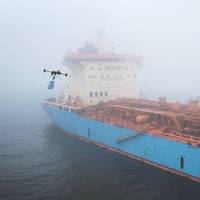Gulf of Guinea Boosts Maritime Security
Maritime security depends on the capacity of national authorities to develop effective port security plans and procedures and the ability to self-audit, says International Maritime Organization (IMO).A regional workshop for participants from a number of countries in the Gulf of Guinea, held in Tema, Ghana (13-16 November) has helped to build national capacity to enhance port security. Benin, Cameroon, Cote d’Ivoire, Equatorial Guinea, Gabon, Ghana, Nigeria, Sao Tome & Principe, Senegal, Sierra Leone and Togo participated in the workshop.The training focused on how to establish multi-agency port and port facility security and facilitation committees with specific terms of reference…
Drones: Is the Maritime Industry Ready?

Unmanned aerial systems (UAS), or “drones” in common parlance, are not a part of the historical maritime vocabulary. At least not yet. While the term “drones” may conjure images from science fiction, the reality is that companies are designing commercial UAS for the private sector, and they are gradually permeating our daily life. Henry Ford is rumored to have opined on his invention of the automobile that if he had asked people what they wanted, they would have said “faster horses.” In the case of UAS…
EC Sues Spain over Port Security
The European Commission is taking action against Spain before the Court of Justice of the European Union, because 20 Spanish ports have yet to adopt and implement the port security plan. The main objective of European port security policy is to provide protection for ships and port facilities, as part of the maritime link in the transport logistics chain, against the risk of attacks and terrorism. Directive 2005/65/EC on enhancing port security aims to guarantee uniformly high levels of security in all European ports, in particular by implementing a port security plan laying down provisions for ensuring port security. Since June 15, 2007…
IMSN Earns DNV Certification for Anti-Piracy Course

Dania Beach, FL (April 21, 2011) – International Maritime Security Network (IMSN) has become the first maritime security training center to offer an eLearning-based Anti-Piracy Defense Course certified by Det Norske Veritas (DNV), a worldwide leading certification body offering the latest in management systems certification services, under its SeaSkill™ standard for maritime learning programs. The announcement was made by Captain Timothy D. Nease (ret.), co-founder and CEO of IMSN, at the Ship Operations Cooperative Program (SOCP) in Dania Beach, Fla.
Senator Murray Blasts Bush's Security Funding
Our nation’s ports are an essential component of our economic infrastructure, and they represent one of our greatest vulnerabilities, but the Administration’s budget will weaken our investment in port security. Last week, the President was at the Port of Charleston to talk about seaport and cargo security. It is one thing to give a speech in front of our Coast Guard assets and quite another to actually provide the men and women of the Coast Guard with the tools they need to do their job. This Administration is flirting with disaster with its lack of sustained and serious attention to port security. We cannot allow any port in this country to become a weak link in the security chain.
SOCP to Meet in Puerto Rico
The Ship Operations Cooperative Program (SOCP), sponsored by the Maritime Administration (MARAD), will meet in San Juan, Puerto Rico on June 22-24. Topics on the agenda include shipboard and port security plans; bridge technologies; mariner credentialing; and ballast water technology. For more information visit http://www.socp.org/main.shtml
As Concerns About Seaport Security Mount, the U.S. Government Reacts
"Maritime Domain Awareness" is the new watchword for the maritime community. The discovery of a well equipped, suspected Al-Qa'eda member in a cargo container in Italy was one of the recent stark lessons in the vulnerability of maritime transportation security. In addition, the U.S. Coast Guard temporarily denied entry to the liquefied natural gas tanker Matthew to Boson for insufficient security and a crew member on another vessel who jumped ship in New Orleans was later found to have the telephone number of an Al-Qa'eda terrorist. Congress and the Executive branch are now turning their attention to improving seaport security in ways that could disrupt the movement of ships, freight, crews, and passengers and result in major operational changes for companies in the industry.
IMO To Address Maritime Security Issues
Experts in maritime security from governments and industry will gather in London next week at the Headquarters of the International Maritime Organization (IMO) for an inter-governmental meeting devoted to maritime security and counter-terrorism issues. A special intersessional working group of the IMO’s Maritime Safety Committee (MSC) will convene for a week-long session (February 11th-15th) to begin in earnest the process of reviewing and revising all existing IMO measures and procedures to deal with acts of terrorism which threaten the security of passengers and crews and the safety of ships. Among the many topics scheduled for discussion will be issues related to the installation of automatic identification systems on ships…
AAPA Tells Congress Funding Falls Short
American Association of Port Authorities' (AAPA) Chairman of the Board Dick Steinke, executive director of the Port of Long Beach, told Congress today that at least 52 U.S. public port agencies say they intend to apply for Department of Transportation Port Security Grants totaling $222.8 million. This far exceeds the $93.3 million appropriated by Congress for this program. Steinke testified on behalf of AAPA during a hearing of the Subcommittee on Coast Guard and Marine Transportation, House Transportation and Infrastructure Committee. As state and local government agencies, Steinke said in written testimony, public port authorities warrant Federal help and assistance, to avoid new requirements becoming unfunded Federal mandates. Grants, he explained, are the best way to do this.
Rear Admiral Paul Pluta Redefines Maritime Security
Rear Admiral (RADM) Paul Pluta, the man in charge of ensuring the security of the 361 ports and 95,000 miles of coastline in the U.S., had to quickly shift gears in the hours following September 11. Hired initially to beef up environmental protection and passenger vessel safety, Pluta realized after that day, that his role as Assistant Commandant for Marine Safety, Security and Environmental Protection, U.S. Coast Guard, had changed dramatically in the hours following. September 11 began like any other for RADM Pluta. Working out of his office in Washington, D.C. where he was appointed to earlier that year by Coast Guard Admiral James Loy…
MultiService Formed to Fulfill Maritime Security Needs
Multiservice Srl is a new company specializing in security especially maritime using highly qualified professionals. Staff include engineers and technicians with much experience in maritime affairs and in certification. Currently Multiservice Srl can certify the management of passenger vessels including RoRo ferries and high-speed craft. Multiservice also supplies numerous shipping companies with various technical services. Multiservice group has also built up substantial experience in the preoaration of port security plans (ISPS Code) and has available personel able to function as port facility security officers. Reach Multiservice group’s at Stazione Marittima, Piazzale Angioino, 80133 Naples. Tel: +39 081 4972264 and Fax: +39 081 4972228
USCG Issues Port Security Guidelines
The U.S. Coast Guard issued Navigation and Vessel Inspection Circular (NVIC) 9-02 entitled Guidelines for Port Security Committees and Port Security Plans Required for U.S. Ports Building on its Maritime Homeland Security Mission, the Coast Guard Headquarters has advised its field units on how to structure the Port Security Committees and how to develop Port Security Plans. By February 28, 2003, each Captain of the Port (COTP) is to conduct a preliminary port level security assessment in conjunction with the Port Security Committee. The assessment will provide the basis for finalizing the Port Security Plan. Source: HK Law
Government Update: Secure Marine Transportation ... Priceless?
In the Maritime Transportation Security Act (MTSA), signed into law on November 25, 2002, Congress directed the U.S. Coast Guard to, among other things, establish a vessel security plan requirement for appropriate vessels operating in United States waters. Congress broadly defined the vessels that should have security plans as those that the Secretary (of the Department in which the Coast Guard is operating) believes may be involved in a transportation security incident. A 'transportation security incident' is defined as a security incident resulting in a significant loss of life, environmental damage, transportation system disruption, or economic disruption in a particular area.
CSR Submits Data To Coast Guard
March and submitted to the United States Coast Guard. States ports. leave denials and CSR continues to collect data," said Douglas B. Director of the Center for Seafarers' Rights. port officials continue to develop port security plans. shore leave to seafarers. 7, 2003. Charles, Louisiana; and Port of Baltimore, Maryland. leave denial (64 percent of all the ships). or crew list visas. 2003. in the submission. crew's immigration status. Stevenson.
President Bush Announces STAR Initiative
In conjunction with the Asia-Pacific Economic Cooperation (APEC) Conference in Los Cabos, Mexico, the White House issued a Fact Sheet discussing the Secure Trade in the APEC Region (STAR) Initiative, which is intended to enhance security while increasing trade. The STAR Initiative commits APEC economies to accelerate action on screening people and cargo for security before transit, increasing security on ships and airplanes while en route, and enhancing security in seaports and airports. The plan of action, which was also discussed in Remarks
The Irony Of Maritime Security
It now appears that the 107th United States Congress will enact new maritime security legislation during a lame-duck session to be held this month. This is ironic since both Senate and the House of Representatives passed maritime security bills months ago, the two measures were largely similar, and the two houses have been conferencing on development of a joint measure for some time. The purpose of this paper is not to dwell on the issues that delayed earlier passage of the measure. Rather, it is to review what new maritime security measures have been adopted by the various federal agencies utilizing their existing authority. As with the beginning of U.S. involvement in WW II and the Korean War, the War against Terrorism has started out as a 'come as you are' event.





